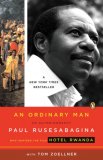Summary | Excerpt | Reading Guide | Reviews | Beyond the Book | Readalikes | Genres & Themes | Author Bio

Critics' Opinion:
Readers' Opinion:
First Published:
Apr 2006, 288 pages
Paperback:
Mar 2007, 224 pages
 Book Reviewed by:
Book Reviewed by:
BookBrowse Review Team
Buy This Book
And the way they died...I can’t bear to think about it for
long. Many went slowly from slash wounds, watching their own blood gather in
pools in the dirt, perhaps looking at their own severed limbs, oftentimes with
the screams of their parents or their children or their husbands in their ears.
Their bodies were cast aside like garbage, left to rot in the sun, shoveled into
mass graves with bulldozers when it was all over. It was not the largest
genocide in the history of the world, but it was the fastest and most efficient.
At the end, the best you can say is that my hotel saved about
four hours’ worth of people. Take four hours away from one hundred days and you
have an idea of just how little I was able to accomplish against the grand
design.
What did I have to work with? I had a five-story building. I
had a cooler full of drinks. I had a small stack of cash in the safe. And I had
a working telephone and I had my tongue. It wasn’t much. Anybody with a gun or a
machete could have taken these things away from me quite easily. My
disappearance—and that of my family—would have barely been noticed in the
torrents of blood coursing through Rwanda in those months. Our bodies would have
joined the thousands in the east-running rivers floating toward Lake Victoria,
their skins turning white with water rot.
I wonder today what exactly it was that allowed me to stop
the killing clock for four hours.
There were a few things in my favor, but they do not explain
everything. I was a Hutu because my father was Hutu, and this gave me a certain
amount of protection against immediate execution. But it was not only Tutsis who
were slaughtered in the genocide; it was also the thousands of moderate Hutus
who were suspected of sympathizing with or even helping the Tutsi "cockroaches."
I was certainly one of these cockroach-lovers. Under the standards of mad
extremism at work then I was a prime candidate for a beheading.
Another surface advantage: I had control of a luxury hotel,
which was one of the few places during the genocide that had the image of being
protected by soldiers. But the important word in that sentence is image.
In the opening days of the slaughter, the United Nations had left four unarmed
soldiers staying at the hotel as guests. This was a symbolic gesture. I was also
able to bargain for the service of five Kigali policemen. But I knew these men
were like a wall of tissue paper standing between us and a flash flood.
I remembered all too well what had happened at a place called
Official Technical School in a suburb called Kicukiro, where nearly two thousand
terrified refugees had gathered because there was a small detachment of United
Nations soldiers staying there. The refugees thought—and I don’t blame them—that
the blue helmets of the UN would save them from the mobs and their machetes. But
after all the foreign nationals at the school were put onto airplanes safely,
the Belgians themselves left the country, leaving behind a huge crowd of
refugees begging for protection, even begging to be shot in the head so they
wouldn’t have to face the machetes. The killing and dismemberment started just
minutes later. It would have been better if the soldiers had never been there to
offer the illusion of safety. Even the vaguest rumor of rescue had been fatal to
those on the wrong side of the racial divide. They had clustered in one spot and
made it easy for their executioners to find them. And I knew my hotel could
become an abattoir just like that school.
Yet another of my advantages was a very strange one. I knew
many of the architects of the genocide and had been friendly with them. It was,
in a way, part of my job. I was the general manager of a hotel called the
Diplomates, but I was eventually asked to take charge of a sister property, the
nearby Hotel Mille Collines, where most of the events described in this book
took place. The Mille Collines was the place in Kigali where the power
classes of Rwanda came to meet Western businessmen and dignitaries. Before the
killing started I had shared drinks with most of these men, served them
complimentary plates of lobster, lit their cigarettes. I knew the names of their
wives and their children. I had stored up a large bank of favors. I cashed them
all in—and then borrowed heavily—during the genocide. My preexisting friendship
with General Augustin Bizimungu in particular helped save the Mille Collines
from being raided many times over. But alliances always shift, particularly in
the chaos of war, and I knew my supply of liquor and favors would run dry in
some crucial quarters. Before the hundred days were over a squad of soldiers was
dispatched to kill me. I survived only after a desperate half hour during which
I called in even more favors.
Copyright Paul Rusesabagina 2006. All rights reserved. No part of this book maybe reproduced without written permission from the publisher, Viking Press.





The Funeral Cryer by Wenyan Lu
Debut novelist Wenyan Lu brings us this witty yet profound story about one woman's midlife reawakening in contemporary rural China.
Your guide toexceptional books
BookBrowse seeks out and recommends the best in contemporary fiction and nonfiction—books that not only engage and entertain but also deepen our understanding of ourselves and the world around us.